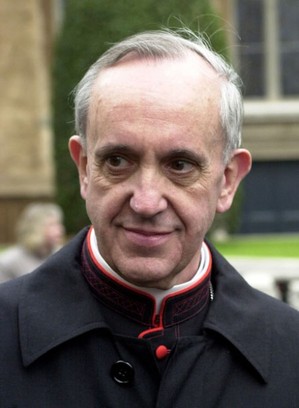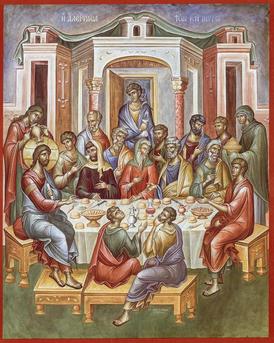 Research is running on steroids in the hours since Jorge Mario Bergoglio was elected to be our new Roman Pontiff, Francis. This is especially true with members of Communion and Liberation who are eager to see what connection they can make with the new Pope. Who could blame us?
Research is running on steroids in the hours since Jorge Mario Bergoglio was elected to be our new Roman Pontiff, Francis. This is especially true with members of Communion and Liberation who are eager to see what connection they can make with the new Pope. Who could blame us?
Tag: Mystery
“Why I am a Catholic?” is a good question to ask
McGill University professor of History John Zucchi, Canada’s national leader for Communion and Liberation, asks the provocative question in a brief essay, “Why I am a Catholic.” John is a great guy, he’s serious about his faith and he’s sensitive to the movement of the Holy Spirit, but no one would claim he’s a mediocre follower of Christ. The claims of faith in Christ, Zucchi tells us, have to have two criteria borrowing from Luigi Giussani: faith in Christ has to be reasonable and it has to broaden my humanity, a gift given by God Himself. Reason and humanity lead to and exude Mercy. Paraphrasing Cardinal Ratzinger in God and the World, to be a Christian means that you are sympathetic toward one’s humanity that of another; a Christian is accepting of one’s injuries and within these wounds a deeper healing is found.
Pope Benedict’s homily for Holy Thursday 2009
Qui, pridie quam pro nostra omniumque salute pateretur, hoc est hodie, accepit panem: [Who, the day before he suffered for the salvation of us and of all — that is, today — he took the bread:] these words we shall pray today in the Canon of the Mass. “Hoc est hodie” [“That is, today”] – the Liturgy of Holy Thursday places the word “today” into the text of the prayer, thereby emphasizing the particular dignity of this day. It was “today” that He did this: he gave himself to us for ever in the Sacrament of his Body and Blood. This “today” is first and foremost the memorial of that first Paschal event. Yet it is something more. With the Canon, we enter into this “today”. Our today comes into contact with his today. He does this now. With the word “today”, the Church’s Liturgy wants us to give great inner attention to the mystery of this day, to the words in which it is expressed. We therefore seek to listen in a new way to the institution narrative, in the form in which the Church has formulated it, on the basis of Scripture and in contemplation of the Lord himself.
 The first thing to strike us is that the institution narrative is not an independent phrase, but it starts with a relative pronoun: qui pridie. This “qui” connects the entire narrative to the preceding section of the prayer, “let it become for us the body and blood of Jesus Christ, your only Son, our Lord.” In this way, the institution narrative is linked to the preceding prayer, to the entire Canon, and it too becomes a prayer. By no means is it merely an interpolated narrative, nor is it a case of an authoritative self-standing text that actually interrupts the prayer. It is a prayer. And only in the course of the prayer is the priestly act of consecration accomplished, which becomes transformation, transubstantiation of our gifts of bread and wine into the Body and Blood of Christ. As she prays at this central moment, the Church is fully in tune with the event that took place in the Upper Room, when Jesus’ action is described in the words: “gratias agens benedixit – he gave you thanks and praise”. In this expression, the Roman liturgy has made two words out of the one Hebrew word berakha, which is rendered in Greek with the two terms eucharistía and eulogía. The Lord gives thanks. When we thank, we acknowledge that a certain thing is a gift that has come from another. The Lord gives thanks, and in so doing gives back to God the bread, “fruit of the earth and work of human hands”, so as to receive it anew from him. Thanksgiving becomes blessing. The offering that we have placed in God’s hands returns from him blessed and transformed. The Roman liturgy rightly interprets our praying at this sacred moment by means of the words: “through him, we ask you to accept and bless these gifts we offer you in sacrifice”. All this lies hidden within the word “eucharistia”.
The first thing to strike us is that the institution narrative is not an independent phrase, but it starts with a relative pronoun: qui pridie. This “qui” connects the entire narrative to the preceding section of the prayer, “let it become for us the body and blood of Jesus Christ, your only Son, our Lord.” In this way, the institution narrative is linked to the preceding prayer, to the entire Canon, and it too becomes a prayer. By no means is it merely an interpolated narrative, nor is it a case of an authoritative self-standing text that actually interrupts the prayer. It is a prayer. And only in the course of the prayer is the priestly act of consecration accomplished, which becomes transformation, transubstantiation of our gifts of bread and wine into the Body and Blood of Christ. As she prays at this central moment, the Church is fully in tune with the event that took place in the Upper Room, when Jesus’ action is described in the words: “gratias agens benedixit – he gave you thanks and praise”. In this expression, the Roman liturgy has made two words out of the one Hebrew word berakha, which is rendered in Greek with the two terms eucharistía and eulogía. The Lord gives thanks. When we thank, we acknowledge that a certain thing is a gift that has come from another. The Lord gives thanks, and in so doing gives back to God the bread, “fruit of the earth and work of human hands”, so as to receive it anew from him. Thanksgiving becomes blessing. The offering that we have placed in God’s hands returns from him blessed and transformed. The Roman liturgy rightly interprets our praying at this sacred moment by means of the words: “through him, we ask you to accept and bless these gifts we offer you in sacrifice”. All this lies hidden within the word “eucharistia”.
Continue reading Pope Benedict’s homily for Holy Thursday 2009